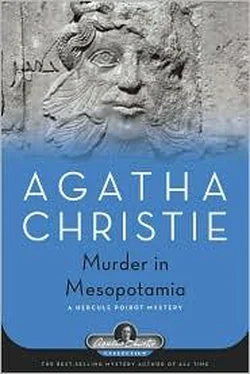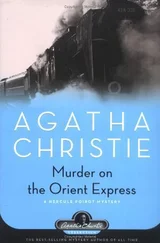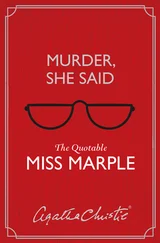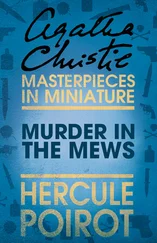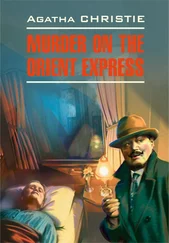Agatha Christie - Murder in Mesopotamia
Здесь есть возможность читать онлайн «Agatha Christie - Murder in Mesopotamia» весь текст электронной книги совершенно бесплатно (целиком полную версию без сокращений). В некоторых случаях можно слушать аудио, скачать через торрент в формате fb2 и присутствует краткое содержание. Год выпуска: 2007, ISBN: 2007, Издательство: Black Dog & Leventhal Publishers, Inc., Жанр: Классический детектив, на английском языке. Описание произведения, (предисловие) а так же отзывы посетителей доступны на портале библиотеки ЛибКат.
- Название:Murder in Mesopotamia
- Автор:
- Издательство:Black Dog & Leventhal Publishers, Inc.
- Жанр:
- Год:2007
- ISBN:ISBN-13: 9781579126919
- Рейтинг книги:3 / 5. Голосов: 1
-
Избранное:Добавить в избранное
- Отзывы:
-
Ваша оценка:
- 60
- 1
- 2
- 3
- 4
- 5
Murder in Mesopotamia: краткое содержание, описание и аннотация
Предлагаем к чтению аннотацию, описание, краткое содержание или предисловие (зависит от того, что написал сам автор книги «Murder in Mesopotamia»). Если вы не нашли необходимую информацию о книге — напишите в комментариях, мы постараемся отыскать её.
Murder in Mesopotamia — читать онлайн бесплатно полную книгу (весь текст) целиком
Ниже представлен текст книги, разбитый по страницам. Система сохранения места последней прочитанной страницы, позволяет с удобством читать онлайн бесплатно книгу «Murder in Mesopotamia», без необходимости каждый раз заново искать на чём Вы остановились. Поставьте закладку, и сможете в любой момент перейти на страницу, на которой закончили чтение.
Интервал:
Закладка:
‘But underneath her consciousness was a gnawing sense of guilt which was to play its part in her future destiny.
‘We now come directly to the question of the letters. Mrs Leidner was highly attractive to the male sex. On several occasions she was attracted by them – but in each case a threatening letter played its part and the affair came to nothing.
‘Who wrote those letters? Frederick Bosner or his brother William or Mrs Leidner herself?
‘There is a perfectly good case for either theory. It seems clear to me that Mrs Leidner was one of those women who do inspire devouring devotions in men, the type of devotion which can become an obsession. I find it quite possible to believe in a Frederick Bosner to whom Louise, his wife, mattered more than anything in the world! She had betrayed him once and he dared not approach her openly, but he was determined at least that she should be his or no one’s. He preferred her death to her belonging to another man.
‘On the other hand, if Mrs Leidner had, deep down, a dislike of entering into the marriage bond, it is possible that she took this way of extricating herself from difficult positions. She was a huntress who, the prey once attained, had no further use for it! Craving drama in her life, she invented a highly satisfactory drama – a resurrected husband forbidding the banns! It satisfied her deepest instincts. It made her a romantic figure, a tragic heroine, and it enabled her not to marry again.
‘This state of affairs continued over a number of years. Every time there was any likelihood of marriage – a threatening letter arrived.
‘But now we come to a really interesting point. Dr Leidner came upon the scene – and no forbidding letter arrived! Nothing stood in the way of her becoming Mrs Leidner. Not until after her marriage did a letter arrive.
‘At once we ask ourselves – why?
‘Let us take each theory in turn.
…‘If Mrs Leidner wrote the letters herself the problem is easily explained. Mrs Leidner really wanted to marry Dr Leidner. And so she did marry him. But in that case, why did she write herself a letter afterwards? Was her craving for drama too strong to be suppressed? And why only those two letters? After that no other letter was received until a year and a half later.
‘Now take the other theory, that the letters were written by her first husband, Frederick Bosner (or his brother). Why did the threatening letter arrive after the marriage? Presumably Frederick could not have wanted her to marry Leidner. Why, then, did he not stop the marriage? He had done so successfully on former occasions. And why, having waited till the marriage had taken place, did he then resume his threats?
‘The answer, an unsatisfactory one, is that he was somehow or other unable to protest sooner. He may have been in prison or he may have been abroad.
‘There is next the attempted gas poisoning to consider. It seems extremely unlikely that it was brought about by an outside agency. The likely persons to have staged it were Dr and Mrs Leidner themselves. There seems no conceivable reason why Dr Leidner should do such a thing, so we are brought to the conclusion that Mrs Leidner planned and carried it out herself.
‘Why? More drama?
‘After that Dr and Mrs Leidner go abroad and for eighteen months they lead a happy, peaceful life with no threats of death to disturb it. They put that down to having successfully covered their traces, but such an explanation is quite absurd. In these days going abroad is quite inadequate for that purpose. And especially was that so in the case of the Leidners. He was the director of a museum expedition. By inquiry at the museum, Frederick Bosner could at once have obtained his correct address. Even granting that he was in too reduced circumstances to pursue the couple himself there would be no bar to his continuing his threatening letters. And it seems to me that a man with his obsession would certainly have done so.
‘Instead nothing is heard of him until nearly two years later when the letters are resumed.
‘Why were the letters resumed?
‘A very difficult question – most easily answered by saying that Mrs Leidner was bored and wanted more drama. But I was not quite satisfied with that. This particular form of drama seemed to me a shade too vulgar and too crude to accord well with her fastidious personality.
‘The only thing to do was to keep an open mind on the question.
‘There were three definite possibilities: (1) the letters were written by Mrs Leidner herself; (2) they were written by Frederick Bosner (or young William Bosner); (3) they might have been written originally by either Mrs Leidner or her first husband, but they were now forgeries – that is, they were being written by a third person who was aware of the earlier letters.
‘I now come to direct consideration of Mrs Leidner’s entourage.
‘I examined first the actual opportunities that each member of the staff had had for committing the murder.
‘Roughly, on the face of it, anyone might have committed it (as far as opportunity went), with the exception of three persons.
‘Dr Leidner, by overwhelming testimony, had never left the roof. Mr Carey was on duty at the mound. Mr Coleman was in Hassanieh.
‘But those alibis, my friends, were not quite as good as they looked. I except Dr Leidner’s. There is absolutely no doubt that he was on the roof all the time and did not come down until quite an hour and a quarter after the murder had happened.
‘But was it quite certain that Mr Carey was on the mound all the time?
‘And had Mr Coleman actually been in Hassanieh at the time the murder took place?’
Bill Coleman reddened, opened his mouth, shut it and looked round uneasily.
Mr Carey’s expression did not change.
Poirot went on smoothly.
‘I also considered one other person who, I satisfied myself, would be perfectly capable of committing murder if she felt strongly enough. Miss Reilly has courage and brains and a certain quality of ruthlessness. When Miss Reilly was speaking to me on the subject of the dead woman, I said to her, jokingly, that I hoped she had an alibi. I think Miss Reilly was conscious then that she had had in her heart the desire, at least, to kill. At any rate she immediately uttered a very silly and purposeless lie. She said she had been playing tennis on that afternoon. The next day I learned from a casual conversation with Miss Johnson that far from playing tennis, Miss Reilly had actually been near this house at the time of the murder. It occurred to me that Miss Reilly, if not guilty of the crime, might be able to tell me something useful.’
He stopped and then said quietly: ‘Will you tell us, Miss Reilly, what you did see that afternoon?’
The girl did not answer at once. She still looked out of the window without turning her head, and when she spoke it was in a detached and measured voice.
‘I rode out to the dig after lunch. It must have been about a quarter to two when I got there.’
‘Did you find any of your friends on the dig?’
‘No, there seemed to be no one there but the Arab foreman.’
‘You did not see Mr Carey?’
‘No.’
‘Curious,’ said Poirot. ‘No more did M. Verrier when he went there that same afternoon.’
He looked invitingly at Carey, but the latter neither moved nor spoke.
‘Have you any explanation, Mr Carey?’
‘I went for a walk. There was nothing of interest turning up.’
‘In which direction did you go for a walk?’
‘Down by the river.’
‘Not back towards the house?’
‘No.’
‘I suppose,’ said Miss Reilly, ‘that you were waiting for someone who didn’t come.’
He looked at her but didn’t answer.
Poirot did not press the point. He spoke once more to the girl.
Читать дальшеИнтервал:
Закладка:
Похожие книги на «Murder in Mesopotamia»
Представляем Вашему вниманию похожие книги на «Murder in Mesopotamia» списком для выбора. Мы отобрали схожую по названию и смыслу литературу в надежде предоставить читателям больше вариантов отыскать новые, интересные, ещё непрочитанные произведения.
Обсуждение, отзывы о книге «Murder in Mesopotamia» и просто собственные мнения читателей. Оставьте ваши комментарии, напишите, что Вы думаете о произведении, его смысле или главных героях. Укажите что конкретно понравилось, а что нет, и почему Вы так считаете.
